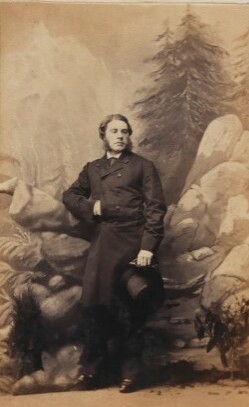External links
Frederick Fagge at ESPNcricinfo
John Frederick Fagge (5 October 1814 – 30 March 1884) was an English clergyman who played first-class cricket between 1833 and 1853. He was born at Chartham in Kent in 1814, the fourth son of Sir John Fagge, the 6th of the Fagge baronets who was also the vicar of Chartham. [1] [2]
Fagge was educated at University College, Oxford. He became a Church of England priest and was curate and then vicar of Aston Cantlow in Warwickshire from 1849 to 1876. [1] [2] In 1844 he married Rose Baker. His first wife, with whom he had three children, died in 1859 and he was remarried in 1861 to Jesse Clark with whom he had another six children. In 1877 he converted to the Roman Catholic church. [2]
Fagge played cricket as an amateur, making his first-class debut in 1833 for the Gentlemen of Kent. He went on to play for a range of teams including Oxford University, Marylebone Cricket Club (MCC) and the Gentlemen as well as making an appearance for an England team in 1833. He played for Kent both before the formation of the county club in 1842 and later for the first Kent County Cricket Club. [3] He appeared in a total of 44 first-class matches as a right-handed batsman who bowled right arm roundarm medium pace. [4] He made his final first-class appearance in 1853. [4] [5]
He died at Chartham in 1884 aged 69. [4]
Frederick Fagge at ESPNcricinfo
Stephen Amherst or Amhurst, was an English cricketer and organiser of cricket matches.
Charles Joseph Harenc was an English lawyer and amateur cricketer in the mid-19th century. He played cricket for the Gentlemen of Kent, the Kent County Cricket Club teams of the 1840s and for MCC as well as a number of other sides and was regarded as the best Gentleman bowler of his era.
Reverend Henry Watson Barnard was an English clergyman and amateur cricketer who played first-class cricket between 1815 and 1823. He served in the Church of England in Somerset and was a canon of Wells Cathedral.
John Barnard was an English amateur first-class cricketer who was a Fellow of King's College, Cambridge between 1817 and 1878. Barnard was the President of the Marylebone Cricket Club in 1829 and a noted collector of decorative porcelain.
Henry Telford Hayman was an English freemason, clergyman and amateur cricketer. He served in the Church of England in Nottinghamshire and Yorkshire between the 1870s and the late 1930s, was a particularly prominent freemason, acting as Provincial Grand Master of Nottinghamshire and played cricket in Kent and Nottinghamshire, where he also served on the committee of the county club.
Robert William Keate was a career British colonial governor, serving as Commissioner of the Seychelles from 1850 to 1852, Governor of Trinidad from 1857 to 1864, Lieutenant-governor of the Colony of Natal from 1867 to 1872, and Governor of Gold Coast from 7 March 1873 to 17 March 1873.

Edward Hoare Hardcastle was an Anglican clergyman in the late 19th and first half of the 20th century.
Alfred Gillow was an English farmer and amateur cricketer. He was born at St Nicholas-at-Wade in Kent in 1835 and played four first-class cricket matches for Kent County Cricket Club and the amateur Gentlemen of Kent side in 1859 and 1860.
Henry Edward Knatchbull was an English clergyman and amateur cricketer who played top level matches in the 19th century.
The Reverend Honourable Edward Vesey Bligh JP DL was an English cricketer, diplomat and clergyman. A descendant of the Darnley Earldom in Kent he, along with many other members of his family, acted as a patron of cricket in the county during the nineteenth Century.

Reverend Herbert Richard Peel (1831–1885) was an English clergyman. He played cricket for Oxford University and Kent County Cricket Club. He also worked to popularise apiculture.

Henry Blair Mayne was an English lawyer and amateur cricketer who played first-class cricket between 1833 and 1849.

Sir John Robert Laurie Emilius Bayley, 3rd Baronet, later Sir Emilius Laurie, was an English clergyman, baronet and amateur cricketer. He was generally known by his middle-name Emilius and changed his surname to Laurie in 1887.
Philip Menzies Sankey was an English clergyman and cricketer. He played first-class cricket for both Cambridge and Oxford Universities as well as for Kent County Cricket Club and served as a clergyman in Hampshire, Italy and Switzerland.
Reverend Henry Bligh was an English clergyman and cricketer. He played eight first-class cricket matches between 1853 and 1860, five for Kent County Cricket Club, two for the Gentlemen of Kent and one for Marylebone Cricket Club (MCC).
Edward Witherden Curteis was an English soldier who played first-class cricket.
The Reverend Trevitt Reginald Hine-Haycock was an English clergyman who served as Priest in Ordinary to the King from 1905 to 1931 and, briefly, to Queen Elizabeth II in the first years of her reign. He also played cricket as an amateur sportsman for Oxford University and Kent County Cricket Club from 1882 to 1886.
Richard John Streatfeild was an English amateur cricketer who played in six first-class cricket matches during the mid-19th century.